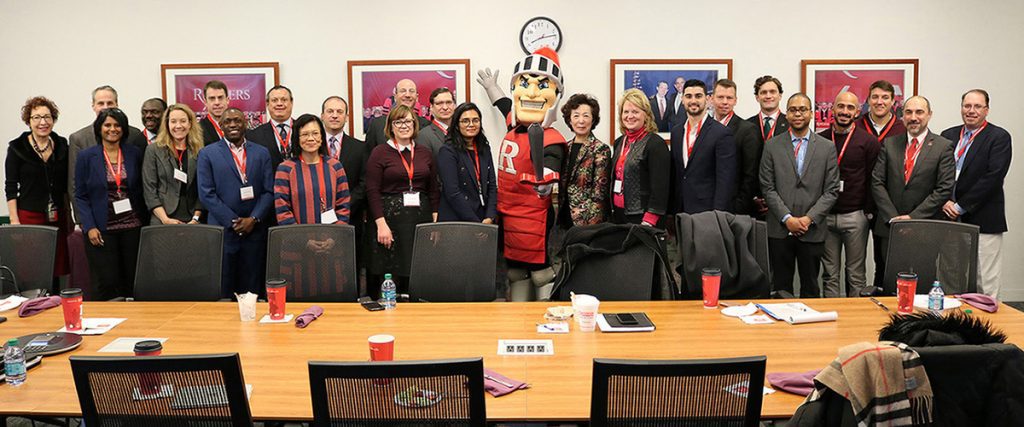New York News: How Climate Change is Effecting Your Mood, and More

Let’s explore some of the most interesting stories that have emerged from New York City business schools this week.
Climate Change Could Explain the Personality of Your Significant Other – CBS Newsroom
New research from Columbia Business School professor Adam Galinsky, along with Ph.D. candidate Jackson Lu has found a curious connection between the climates to which we grew accustomed as youngsters and our dispositions.
“Ambient temperature can shape the fundamental dimensions of personality. Our research reveals a connection between the ambient temperature that individuals were exposed to when they were young and their personality today. This finding can help explain the personality differences we observe in people of different regions.”
To further study to potential climate differences, the paper’s authors conducted research in two of the world’s most densely populated and geographically large countries: the United States and China. Lu explains the results:
“Clement [mild] temperatures encourage individuals to explore the outside environment, where social interactions and new experiences abound. Venturing outdoors and interacting with lots of people make people more agreeable, conscientious, emotionally stable, extraverted, and open to new experiences. But when the temperature is too hot or too cold, individuals are less likely to go outside to meet up with friends or to try new activities.”
Read more about the duo’s research here.
Launching a New Alumni Initiative – Rutgers Business School
The Rutgers Business School recently launched a new Corporate Alumni Advisory Council to strengthen the engagement between its current students and RBS alumni at marquee companies like PwC, Johnson & Johnson, and Wells Fargo.

Several members of the brand new Rutgers Business School Corporate Alumni Advisory Council / Photo via RBS
“This is a very exciting initiative with huge potential for networking, lifelong learning and connecting on so many levels that can benefit our alumni, their companies and Rutgers Business School,” said Andrea Cunnell, director of alumni and corporate engagement at Rutgers Business School.
Read more about the initiative here.
Campus Recruiting Hurts Older Workers, Suit Against PricewaterhouseCoopers Claims – Wall Street Journal
In an interview with Kelsey Gee of the Wall Street Journal, NYU Stern School of Business assistant professor Michael North says that as more and more Americans over the age of 65 delay their retirement, certain corporate biases are hurting them. The result of the bias has become the basis of a lawsuit against PricewaterhouseCoopers.
Gee explains:
Attorneys for the unsuccessful candidates—men who applied to PwC dozens of times in their late 40s and early 50s—aimed to convince San Francisco District Judge Jon Tigar on Tuesday that 14,000 older workers were similarly disadvantaged by the accounting firm’s system of finding applicants at university career fairs and school-affiliated job websites, over a four-year period.
You can read more about the lawsuit here.
For the Most Complex Technology Problems, Stevens Research Turns to Nature – Stevens Institute of Technology
Data science expert Dr. Amir H Gandomi, at the Stevens Institute of Technology School of Business, has used techniques from evolutionary computation to gain insight into large-scale optimization and data-mining problems, as well as supply chain management and customer engagement and interaction.
“When you have mathematical solutions to your problems, that’s great, but real-world problems are more complex — they’re nonlinear, mixed variables, large scale, sometimes black box. In these cases, these kinds of algorithms are flexible and adaptable enough to help you find answers.”
Read more about about Dr. Gandomi’s innovative research here.
These Rutgers MBA Students are Trying to Get Millennials Back Into Bread

Ah, millennials, the capital death swarm destroying unlovable chain restaurants, housing, napkins, beer, golf, diamonds, the banking industry, and Sears, among other things, has moved onto the bread industry like a blind cavalcade of killer bees. Allegedly.
To combat the ceaseless destruction of our much beloved … bread … MBA students at the Rutgers Business School recently helped out local company Hudson Bread , a North Bergen artisanal bakery, to raise brand awareness among the demographic.
Hudson Bread collaborated with Dean Lei Lei and Assistant Professors of Professional Practice Erich Toncre and Marc Kalan to “organize a competition that would challenge students to create a branding strategy” for the company, which “captured the essence of the company, from its ownership to the quality of its ingredients,” according to Hudson Bread’s VP of operations Ray Million.
Rutgers marketing and supply chain major Kristen Tse, along with Brian Lilien, Alyssa Nungra and Akshay Patel, took home the $6,000 grand prize for a campaign strategy that would “refresh the company’s social media accounts and use Google Adwords to make its digital marketing more effective,” while calling on Hudson Bread to “play up its organic qualities.”

RBS winners Akshay Patel, Alyssa Nungra, Brian Lilien and Kristen Tse/Photo via Rutgers
Toncre explains, “[Students] have a great opportunity to apply what they learned in the classroom in developing a marketing campaign to increase the brand awareness and engagement for a “real life” client and see the results in “real time.”
Hudson Bread president Mark Kolodziej writes, “There are a lot of agencies we could have hired, but we wanted something unique.”
Rounding Out the Best Return on Investment for New York City MBAs, Part III

In an accelerated political and economic landscape, New York City remains the center of gravity for international business. But year after year, how do newly minted New Yorkers survive in a city where the cost of living is reportedly 70 percent higher than the national average? This is especially true now when fewer and fewer aspiring professionals can afford to sacrifice continuity of employment to advance their careers.
Supply Chain Management MBAs: The Best New York Programs

Product outsourcing is a hot topic today. Consequently, the supply chain management field is richer, more complex, and more necessary than ever. Optimizing the process of turning a concept into a product and getting that product to the shelf is integral to the success any retailer. No matter where a product is made, the progression from conception to end user is a collaborative effort. An MBA in supply chain management can help you learn who to contact and how to strategize in order to best serve both retailers and consumers.
New York City is among the retail capitals of the world. Schools in the New York metro have easy access to hundreds of CEO speakers, as well as a deluge of internship and job opportunities. Below, we’ve outlined some of our favorites.
The Best NYC Supply Chain Management MBA Programs
Columbia Business School
Though Columbia Business School does not offer concentrations, it would be remiss not to mention this academic powerhouse when considering programs with resources in supply chain management education. Columbia’s supply chain management courses are taught by extraordinarily well-regarded professors, who may serve as resources for students throughout their time at the school. Medini R. Singh, for example, is a sought-after professor. In addition to his 25+ years of teaching experience and numerous teaching awards, Singh serves on the advisory board for the W. Edwards Deming Center for Quality, Productivity, and Competitiveness. According to his bio, Singh’s research focuses on “service and supply chain design, at both the tactical and strategic level.” Singh has also consulted for multiple Fortune 500 companies. Columbia students MBAs will also have access to Awi Federgruen, the Charles E. Exley Professor of Management and Chair of the Decision, Risk and Operations Division of Columbia Business School. Federgruen has published over 120 pieces on the financial services industry, and often consults on supply chain management issues for large corporations.
Rutgers Business School, Newark and New Brunswick
Rutgers Business School offers a Supply Chain Management MBA, the mission of which, according to the website, is to “prepare students to meet and exceed the expectations of the employees experiencing a growing demand for supply chain management and logistics experts.” In fact, the school’s Supply Chain Management program was ranked eleventh on U.S. News & World Report’s 2016 list of best graduate schools for business. This ranking seems apt, considering a whopping 100 percent of the supply chain management MBA students from the class of 2016 were employed within 90 days of graduation. Students of this program have gone on to work various supply chain management jobs at companies like Este Lauder, Colgate, and Johnson & Johnson.
CHECK THIS OUT: Looking At New York City’s Best MBA Return on Investment (Pt. I)
Stern School of Business—New York University
The renowned New York University Stern School of Business provides students with the option of choosing a Supply Chain Management and Global Sourcing Concentration to equip MBAs to navigate supply chain issues in a global economy. Students who pursue this concentration can take classes like Global Sourcing and Open Innovation, Pricing Strategies, and Building and Managing Customer Relationships. Stern gears the specialization toward students aiming to pursue careers in management consulting, managing information systems, product management, and supply chain management. Students in this program can choose two of three core supply chain management courses, and then must take six of the 24 related elective courses.
Gabelli School of Business—Fordham University
The Gabelli School of Business at Fordham University offers many classes that specialize in supply chain management, including Operations Management. Under chair Sarah Jinhui Wu, the Gabelli Operations Management courses “equip students with a solid understanding of core operations concepts and decisions, rigorous analytical thinking and skills, and a creative mindset so they can deal with all of the complex issues of a supply chain.”
Many of the other concentrations offered in the Gabelli School of Business MBA program also offer courses revolving around supply chain management, including Global Sustainability.
No GMAT, No Problem: How These Schools Help MBA Applicants

There’s little joy in agonizing over less-than-stellar GMAT scores, wringing your sweaty hands over a looming GMAT appointment, and/or simply trying to sidestep the standardized nightmare, full stop. Slow down! Go easy on yourself!
For starters, there are plenty of schools that offer GMAT/GRE waivers or weigh other parts of your application more heavily than what you were able to half-remember one random Saturday morning.
Many schools acquiesce that it’s difficult parse out the ideal applicant from a test score and they eliminate many worthwhile candidates in the process. So, are there students who might do just fine in the application process skipping the GMAT rigmarole altogether?
If you have 5-7 years of high-quality work experience, it will certainly carry a lot of weight for applicants without GMAT scores, as will exceptionally high undergraduate GPAs. Applicants who can demonstrate aptitude in a related field can likely get away without GMATs. Candidates with post-graduate degrees in an unrelated field can also have the GMAT waived—let us know your secret for avoiding standardized tests all across the board, by the way.
On the flip side, if you don’t have significant work experience, didn’t graduate cum laude, and can’t demonstrated related (or unrelated) aptitude, you may have to claw tooth and nail to pass that GMAT with flying colors.
For those applicants with the right stuff, let’s take a deeper dive into five Metro-covered schools that don’t require GMAT for admissions:
Suffolk’s Sawyer School of Business
Sawyer School of Business applicants sans GMAT need not fret. Full-time MBA candidates with three years’ work experience and part-time MBA candidates with 5-7 years of experience can apply for waivers. Here are the other potential credentials that can take the place of a GMAT. In all cases documentation is required:
- If you’ve passed the CPA; CFA, Level 1; or the FRM, Level 1 exams
- If you’re a second-semester senior business or economics major or Berklee College of Music music management undergrad with a cumulative GPA of 3.3.
- If you have 2 years of relevant full-time professional work experience and a 3.4 undergraduate GPA; a 3.3 GPA and four years of experience; or 3.2 and six years of experience.
- If you have a MSA, MSF, MSBA, or MST from an AACSB-accredited b-school.
- If you are an ABA-approved law school graduate.
- If you’ve completed any SBS graduate certificate programs with a cumulative 3.3 GPA.
DePaul’s Kellstadt School of Business
If you apply to the Kellstadt School of Business in Chicago without GMAT scores, here are some alternatives that will help you make the cut. Along with an undergraduate degree from an accredited institution, Kellstadt applicants that do not take the GMAT need:
- Five years’ consecutive work experience that demonstrates management and quantitative aptitude.
- JD, MD, Ph.D., MSF degrees.
- 160 LSAT Score.
- Pass the CPA and/or PE exams.
- Any alumni from DePaul’s Driehaus College of Business with 3.2 GPA or higher and two years’ work experience.
YOU MIGHT ALSO LIKE: Social Media Do’s and Don’ts MBAs Need To Know
Rutgers Business School
Holders of a Ph.D., MD, JD, and PharmD, as well as applicants with 3.0-plus undergraduate GPAs are not required to present GMAT scores. Rutgers Business School part-time MBA and Professional Accounting MBA applicants with 10 years’ full-time experience (or 8 if they have a Master’s degree) can apply for GMAT waivers. Other related degree paths that do not require GMAT or GRE scores: The MA in Taxation, the MA in Governmental Accounting, and the MS in Supply Chain.
Pace’s Lubin School of Business
Prospective Pace Lubin School of Business MBAs with a 3.50-plus cumulative undergraduate GPAs or those already in possession of business-related post-graduate degrees can request GMAT waivers. CPAs, CMAs, or practicing lawyers can request GMAT waivers if they apply for the MS in Taxation. Applicants with three years of managerial human resources experience can request GMAT waivers for the MS in Human Resources Management.
Golden Gate University’s Ageno School of Business
The following Ageno School of Business candidates may apply for a GMAT waiver:
- Master’s degrees in unrelated fields.
- Applicants with professional licenses earned by passing a nationally recognized US exam e.g. CPA, CMA, CIA.
- Applicants with cumulative 3.50-plus undergraduate GPAs.
- Applicants with five years’ managerial experience.
- Practicing CFAs, physicians, or attorneys
How Rutgers Encourages Startups to Combat Sexual Misconduct

As Silicon Valley startups continue their apocryphal rise, an avalanche of sexual misconduct allegations has emerged. Rutgers Business School recently discussed the issue, arguing that high-ranking figures in the industry should sign a “No Go, Bro” clause, putting pressure on investors and board members to actively combat any and all misconduct.
As more and more victims of sexual misconduct publicly speak out against their perpetrators, and the Cosby’s, O’Reilly’s, Ailes’, Weinstein’s, and Trump’s of the world are forced to shed the cloak of darkness, the pressure is on for other industries outside entertainment and politics to address toxic work environments that silently condone harassment.
This is especially true in Silicon Valley, where recent high-profile sexual misconduct cases like Social Finance CEO Mike Cagney, UploadVR’s Taylor Freeman, and the recent suit VC firm Benchmark filed against Uber’s Travis Kalanick suggest an end to investor passivity.
The article outlines specific ways that investors can use its decision-making process to affect change from the top. For starters, boards need to establish clear guidelines regarding workplace culture, behavior, and ethics. When abuses of power are built into the very fabric of a company, it becomes easy to normalize misconduct.
Investors need to incorporate contractual language to prevent touchy-feely CEOs from walking away unscathed from a situation in which they misbehave.
“Before making a big investment in a startup, investors should use their power to require CEOs to sign a clause under which they forfeit a large proportion, or potentially all, of their stock, if fired for misconduct, including reasons such as sexual harassment and misrepresentations to investors.”
Ultimately, consumers need to send a clear message to the investors and boards of the companies we patronize that they have to “have to get beyond old-boy and young-bro Silicon Valley psychology [and] exercise their leverage to deter value-destroying misconduct.”
You can check out the entire Rutgers Business School article here.
